Understanding and Addressing Aging-Related Anxiety and Depression
As the global population ages, mental health issues among older adults, including anxiety and depression, become increasingly prevalent. These conditions can significantly impair quality of life, yet often remain underdiagnosed and undertreated. Recognizing the symptoms, causes, and available support systems is crucial for improving mental well-being during later life.
Prevalence and Impact of Mental Health Issues in Older Adults
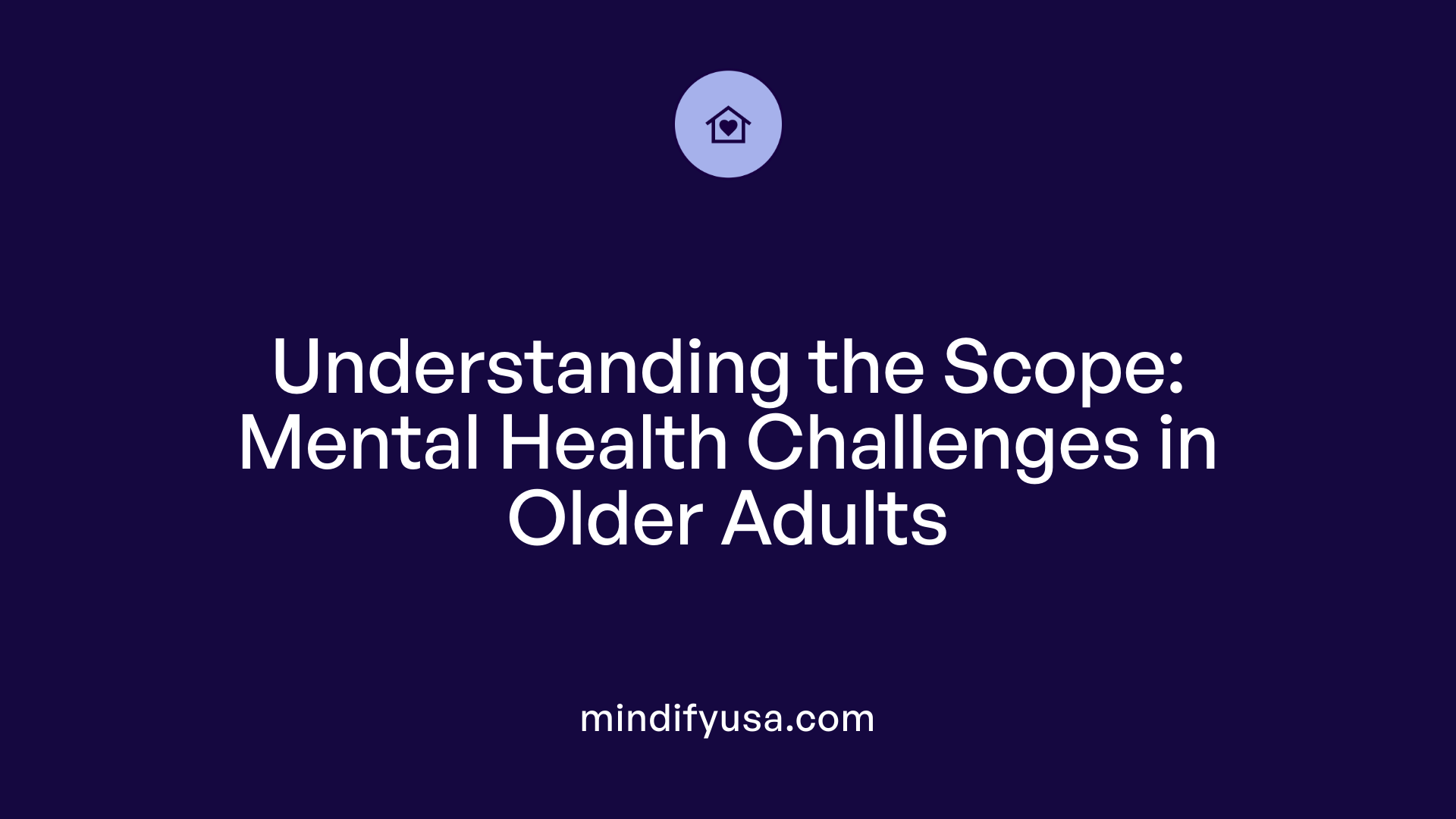 As the global population ages, mental health concerns among older adults are becoming increasingly prevalent. Common issues include depression and anxiety, which often go unrecognized and untreated. About 14% of adults aged 60 and over live with a mental disorder, with depression and anxiety being the most widespread. These conditions can significantly affect daily functioning, impair social interactions, and lead to diminished quality of life.
As the global population ages, mental health concerns among older adults are becoming increasingly prevalent. Common issues include depression and anxiety, which often go unrecognized and untreated. About 14% of adults aged 60 and over live with a mental disorder, with depression and anxiety being the most widespread. These conditions can significantly affect daily functioning, impair social interactions, and lead to diminished quality of life.
Several factors contribute to mental health decline in seniors. Social isolation and loneliness, affecting approximately a quarter of older adults, are major risk factors that can both trigger and exacerbate conditions like depression and anxiety. Physical health issues, loss of loved ones, bereavement, and the stigma associated with mental illness further increase vulnerability.
Symptoms of anxiety in the elderly are diverse and often subtle. They include excessive worry, irrational fears, physical signs such as racing heart, trembling, sweating, nausea, muscle tension, and sleep disturbances. Psychological features like irritability, restlessness, intrusive thoughts, and feelings of hopelessness are also common.
Untreated mental health issues can lead to serious complications, including cognitive decline, increased disability, and heightened risk of chronic illnesses such as cardiovascular disease. Recognizing these symptoms early, promoting social connections, and ensuring access to age-appropriate mental health services are critical in supporting older adults.
| Mental Health Condition | Prevalence | Risk Factors | Impact |
|---|---|---|---|
| Depression | ~14% | Social isolation, illness, loss of loved ones | Reduced mobility, increased disability |
| Anxiety | 10-20% | Medical conditions, past trauma, social isolation | Poor sleep, decreased functioning |
Continuing to improve awareness, reduce stigma, and expand community-based support can help address the mental health needs of aging populations. Strategies such as befriending programs, counseling, medication, and integrated care models contribute to healthier aging and a better quality of life.
Causes and Triggers of Aging-Related Anxiety
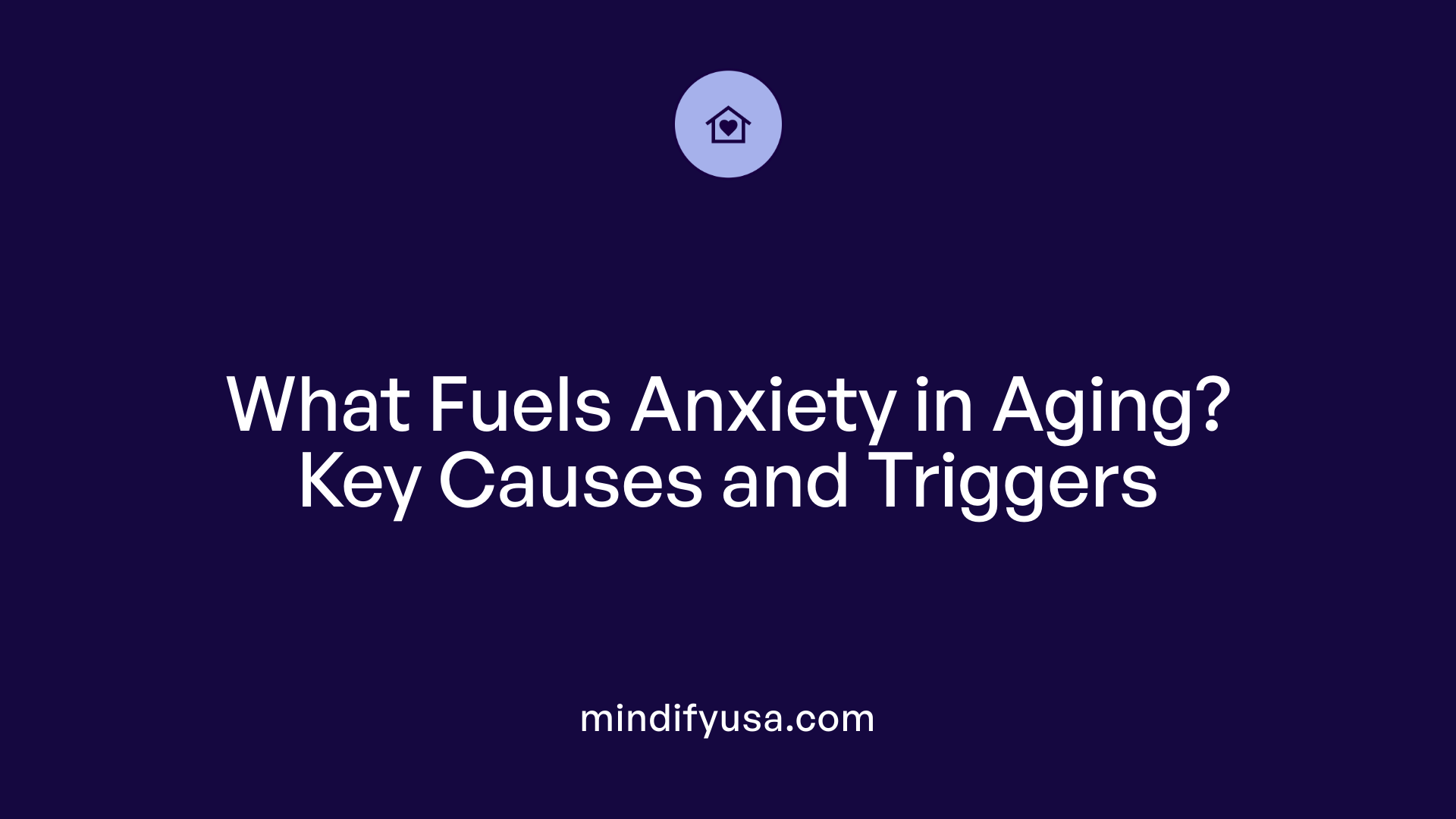
What causes aging-related anxiety and what are its triggers?
Aging-related anxiety is mainly driven by a mix of biological, psychological, and environmental factors. As people age, they often face ongoing health challenges such as chronic illnesses and sleep disturbances, which can heighten feelings of worry and fear.
Medical conditions like heart disease, diabetes, or neurodegenerative disorders, including dementia, can contribute to increased anxiety. Physical impairments or loss of mobility also act as stressors that may trigger anxious feelings.
Psychologically, significant life stressors are common among older adults. These include the grief from losing loved ones, the transition to retirement, and the loss of independence. Concerns about financial security and end-of-life issues further intensify anxiety.
Environmental factors such as social isolation and lack of social support can worsen feelings of vulnerability. Additionally, side effects from medications and genetic predispositions—where anxiety runs in the family—also elevates risk.
Biological changes in the brain related to aging, like brain atrophy and neurodegeneration, play a crucial role. These neurobiological shifts, along with immune-inflammatory processes, can predispose older adults to anxiety.
Overall, aging-related anxiety is a result of a complex interplay between health status, life circumstances, genetic factors, and physiological changes, each contributing to the risk and severity of anxiety symptoms in later life.
Strategies and Interventions for Anxiety Management
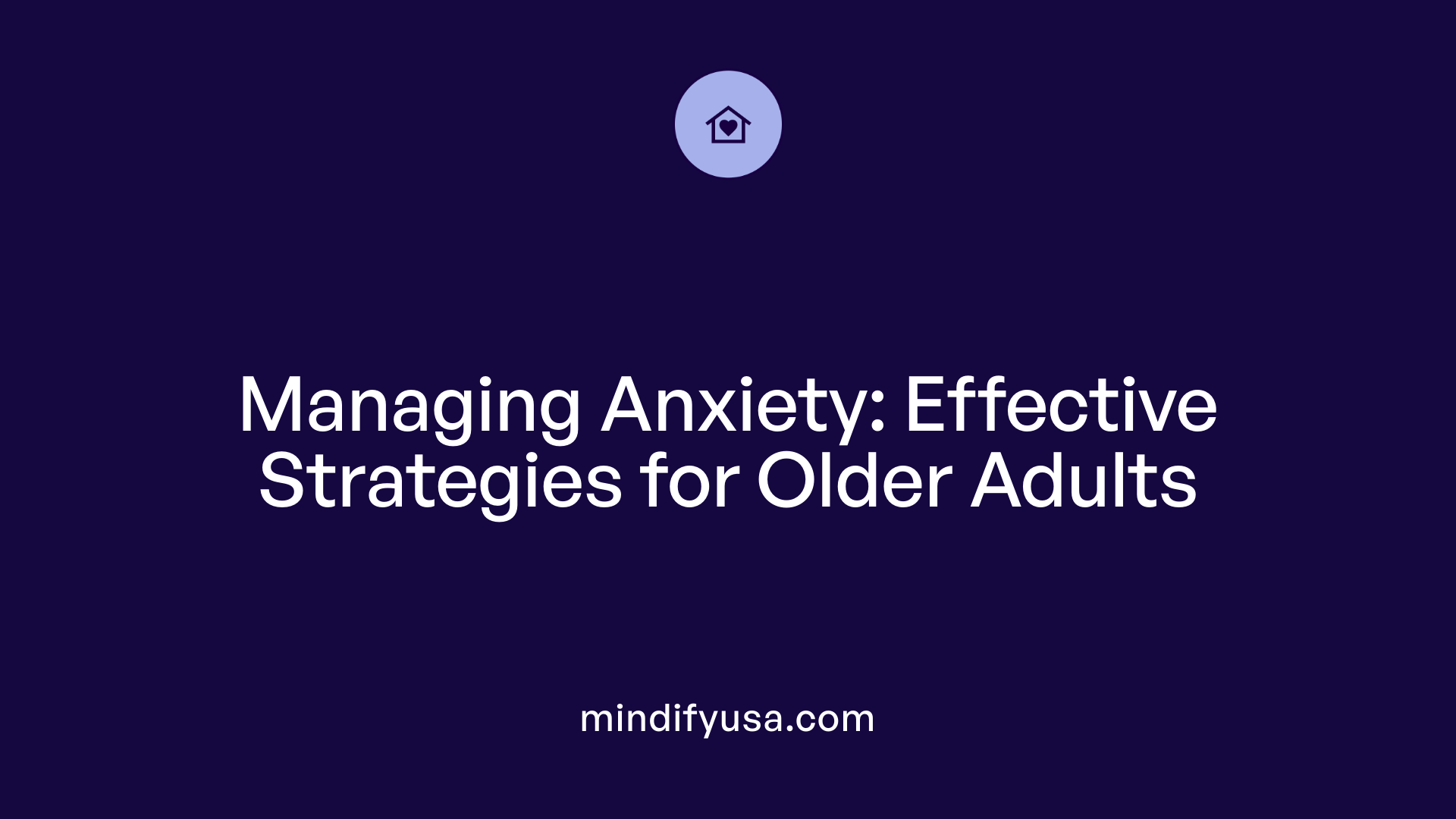 Managing anxiety among older adults involves a mix of medical, psychological, and lifestyle strategies tailored to each individual's needs.
Managing anxiety among older adults involves a mix of medical, psychological, and lifestyle strategies tailored to each individual's needs.
Psychotherapy, especially cognitive-behavioral therapy (CBT), plays a central role. This type of counseling helps seniors identify and challenge irrational worries and develop healthier thought patterns. CBT can be delivered through face-to-face sessions or online platforms, making it accessible to many.
Lifestyle changes are equally important. Regular physical activity, such as walking or light exercise, helps reduce anxiety levels and improves overall mental health. Stress management techniques like mindfulness, meditation, deep breathing exercises, and relaxation activities such as yoga or tai chi are effective tools for calming the mind.
Maintaining social support networks is vital. Connecting with friends, family, or participating in community groups prevents social isolation, which is a major risk factor for anxiety. Engaging in hobbies, volunteering, or spiritual activities can foster a sense of purpose and emotional stability.
Medication options include selective serotonin reuptake inhibitors (SSRIs) and serotonin-norepinephrine reuptake inhibitors (SNRIs). These medications are generally safe but require careful management by healthcare professionals to avoid adverse effects and interactions, especially given seniors' multiple medications. Benzodiazepines are typically avoided or used with caution because of their potential for dependence and side effects.
A comprehensive, multidisciplinary approach is essential. This means involving healthcare providers, mental health specialists, caregivers, and the seniors themselves in devising and following a personalized treatment plan. Such an approach addresses the unique health conditions and risk factors seniors face, promoting better mental health outcomes.
Mental Health Services and Support for Older Adults
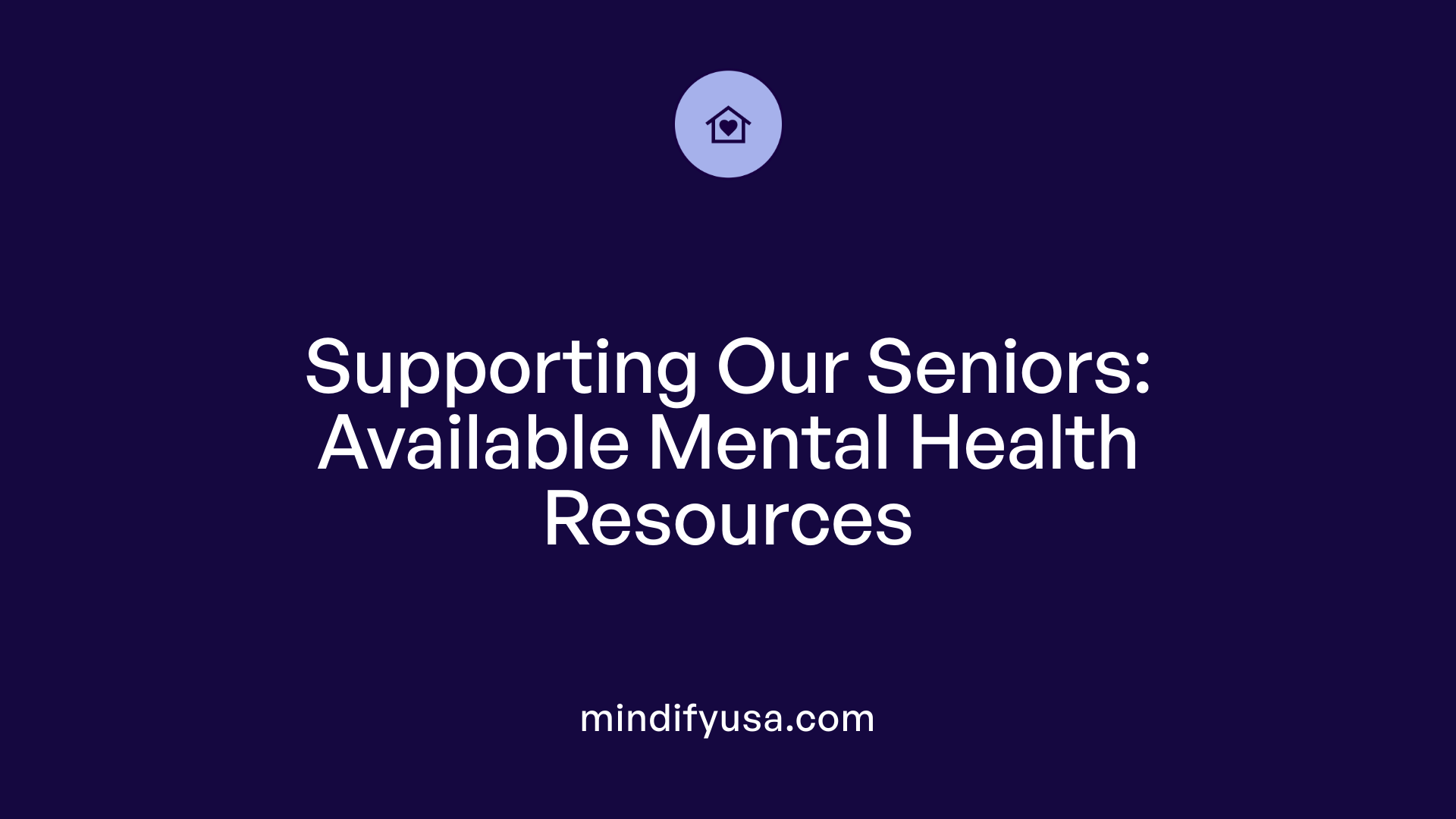 Older adults face unique mental health challenges, such as anxiety, depression, and social isolation, that require accessible and tailored support options.
Older adults face unique mental health challenges, such as anxiety, depression, and social isolation, that require accessible and tailored support options.
Medicare provides comprehensive coverage for mental health services, including outpatient counseling, inpatient care, and prescribed medications. This ensures that seniors can receive professional treatment without facing prohibitive costs.
Community resources play a crucial role in fostering emotional wellbeing. Programs like the Friendship Line and CalHOPE promote social connection through peer counseling, regular well-being check-ins, and emotional support, which are vital for reducing loneliness and managing mental health conditions.
Technology also offers valuable avenues for treatment. Mental health apps such as Headspace, Sanvello, and MoodTools help seniors practice mindfulness, track their moods, and learn coping strategies at their own pace. Online therapy platforms like Talkspace provide convenient access to licensed therapists, making mental health care more reachable for those with mobility issues or limited access to in-person services.
For crisis situations, the 988 Lifeline offers immediate mental health assistance, available 24/7 for anyone experiencing emotional distress or suicidal thoughts. National organizations such as the Substance Abuse and Mental Health Services Administration (SAMHSA) and the American Geriatrics Society develop specialized programs and guidelines aimed at improving mental health outcomes for older adults.
Supporting social engagement through peer support groups, volunteer activities, and community programs is also essential. These initiatives help seniors build social networks, combat loneliness, and foster resilience.
| Support Option | Description | Additional Notes |
|---|---|---|
| Medicare Mental Health Coverage | Outpatient and inpatient mental health services including medication | Ensures financial accessibility |
| Community Programs | Peer counseling, well-being check-ins | Reduces social isolation |
| Online Therapy Apps | Virtual counseling services | Flexible and accessible |
| Crisis Helplines | 988 Lifeline and other hotlines | Immediate support |
| Support for Social Engagement | Peer and community activities | Promotes social cohesion |
Addressing mental health among older adults requires a coordinated effort blending healthcare coverage, community support, technology, and crisis intervention to ensure comprehensive care and improved quality of life.
The Role of Psychological Reactions and Coping Mechanisms
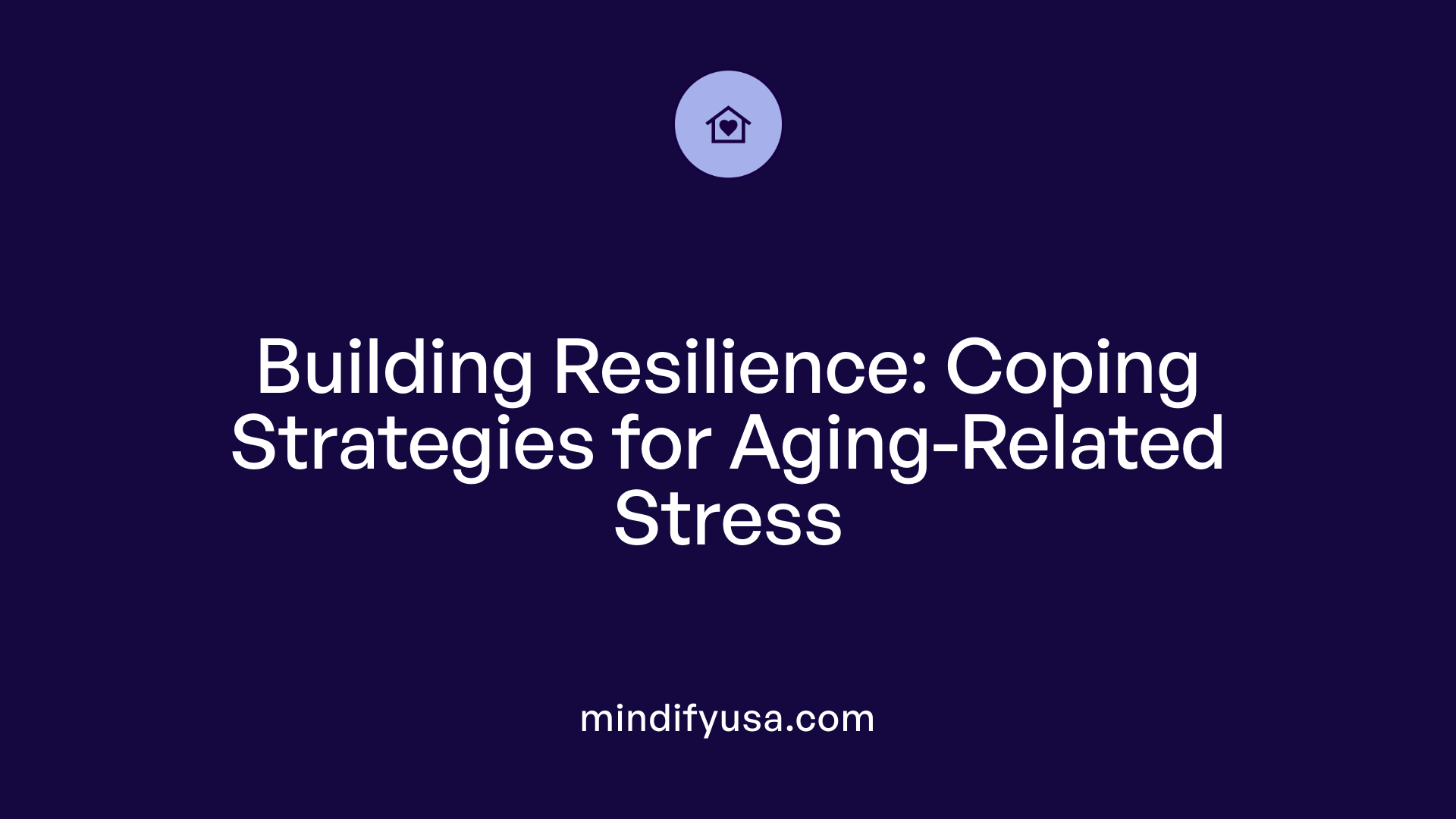
How can psychological reactions and coping mechanisms help address aging-related mental health challenges?
As older adults face various life changes such as health issues, loss of loved ones, or social isolation, their psychological reactions and coping strategies become essential tools for maintaining mental well-being. These mechanisms help manage stress and emotional responses, enabling seniors to adapt effectively.
Practicing mindfulness and meditation allows older individuals to stay grounded, reduce anxiety, and enhance emotional stability. Engaging in hobbies like handicrafts, reading, or spiritual activities promotes a sense of purpose and distraction from worries.
Support groups offer a platform for emotional expression, validation, and shared experiences, which can decrease feelings of loneliness and despair. Talking openly about feelings and frustrations helps in processing grief and stress, fostering resilience.
Building resilience involves developing a positive outlook on aging, recognizing personal strengths, and cultivating an optimistic attitude towards life's later stages. Approaching stressful events with adaptive strategies, such as problem-solving or seeking social support, reinforces the capacity to cope.
Psychological reactions and coping mechanisms work hand-in-hand to buffer against mental health issues like depression and anxiety. Combining self-care practices with professional therapies like Cognitive-Behavioral Therapy (CBT) enhances emotional resilience.
Ultimately, fostering emotional awareness, engaging in social and recreational activities, and applying stress management techniques can lead to improved mental health, helping older adults face aging’s challenges with confidence and adaptability.
Educational Resources for Recognizing and Addressing Anxiety
There are many helpful resources designed to support seniors, caregivers, and families in understanding and managing anxiety. The Anxiety and Depression Association of America (ADAA) is a prominent organization offering valuable tools, including free webinars, brochures, infographics, and a newsletter called Triumph. These materials provide clear information on mental health, strategies to manage anxiety, and available treatment options tailored for older adults.
In addition, ADAA curates blogs, videos, and community stories that focus on coping techniques and personal experiences related to anxiety and mental health challenges in seniors. These resources aim to educate and empower both individuals and their support networks.
Another significant program is Mental Health First Aid for Older Adults. This training teaches skills to identify signs of mental health issues, including anxiety, and how to offer initial help. It also works to reduce stigma surrounding mental health in older populations, fostering a more supportive environment.
Professional organizations such as the American Psychiatric Association (APA) provide further guidance and resources, including clinical practice guidelines, assessment tools, and educational materials for healthcare providers, seniors, and their families. These resources help improve recognition, intervention, and management of anxiety among older adults.
By utilizing these educational tools, caregivers and seniors can better understand anxiety symptoms, learn effective coping mechanisms, and access the appropriate professional support when needed. This proactive approach contributes significantly to maintaining mental well-being and improving quality of life in later years.
Impact of Current Events and Special Considerations
How can current events, such as the COVID-19 pandemic, impact aging-related anxiety and mental health?
The COVID-19 pandemic has had a profound influence on the mental health of older adults. With heightened risks of severe illness, many seniors have experienced increased anxiety related to their health and safety.
Beyond health concerns, the pandemic led to social distancing measures and restrictions that significantly increased feelings of loneliness and social isolation. Over a third of older adults felt lonely, and nearly a quarter experienced social isolation, which are known risk factors for depression and cognitive decline.
Research shows that while some older individuals have demonstrated resilience, the pandemic has still intensified existing mental health issues. Those living alone or with pre-existing health conditions faced greater emotional distress. Disruptions in social support networks and limited access to community activities further worsened these feelings.
Misinformation and fear of contagion also contributed to heightened stress levels. Fear of losing independence or facing severe health consequences increased anxiety among seniors.
Fortunately, protective factors such as maintaining social connections through technology, engaging in adaptive coping strategies, and participating in virtual social groups have helped buffer these adverse effects.
Overall, the COVID-19 crisis highlights the urgent need for targeted mental health support, including telehealth services, virtual community programs, and caregiver involvement, to address the unique challenges faced by aging populations during health crises.
Mitigating social isolation during pandemics
Effective strategies include promoting virtual interactions, supporting access to online mental health resources, and encouraging safe, outdoor social activities where feasible.
Technological tools to support mental health
Tools like online therapy platforms, social media groups, and telehealth services enable older adults to stay connected and receive mental health care remotely.
Special considerations for health crises
Healthcare providers should focus on early detection of mental health deterioration, adapt interventions to remote formats, and consider the physical and emotional vulnerabilities of older adults during crises.
Conclusion and Future Outlook on Mental Health Support for the Elderly
The increasing aging population underscores the importance of early diagnosis and intervention for mental health conditions such as anxiety, depression, and cognitive decline. Recognizing symptoms early allows for timely treatment, which can significantly improve quality of life and delay further mental deterioration.
Integrating mental health services into comprehensive geriatric care is essential. This involves combining medical, psychological, and social support within primary care settings to provide holistic treatment tailored to older adults’ unique needs. Such integration helps reduce stigma and ensures that mental health is prioritized alongside physical health.
Addressing social determinants, including social isolation, ageism, and workforce shortages, is critical for equitable access to mental health services. Community-based programs like befriending schemes, support groups, and outreach initiatives help connect older adults, promoting social engagement and emotional resilience. These programs combat loneliness and foster a sense of belonging, which are vital for mental well-being.
Innovative approaches such as telehealth services, age-specific community groups, and mobile clinics are expanding access to care—especially in remote or underserved areas. These technologies enable ongoing support and targeted interventions, making mental health care more accessible and acceptable for seniors.
Promoting resilience traits like wisdom, adaptability, and positive aging perceptions is fundamental. Initiatives that foster community participation, volunteerism, and lifelong learning help reinforce purpose and self-worth among older adults.
In summary, a multifaceted strategy that includes early detection, integrated services, community engagement, and resilience building holds promise for supporting mental health in aging populations. Such efforts will contribute to healthier, more fulfilling lives for older individuals, emphasizing dignity and well-being in the later years.
Looking Forward: Embracing Mental Wellness in Later Life
Empowering older adults with accessible mental health services, education, and social support is vital to fostering resilience and quality of life. As awareness grows and innovative strategies unfold, society can create an environment where aging with mental wellness is the norm, ensuring dignity and compassionate care for our aging population.
References
- Mental health of older adults - World Health Organization (WHO)
- Mental health care for older adults: recent advances and new ...
- Anxiety and Older Adults: A Guide to Getting the Relief You Need
- Anxiety and Older Adults: Overcoming Worry and Fear
- Older Adult Behavioral Health Care | MaineHealth
- Anxiety in the Golden Years: What You Should Know | Cedars-Sinai
- Addressing the Unique Mental Health Challenges Brought on by ...
- Depression and Older Adults | National Institute on Aging
- Anxiety in the Elderly: Symptoms and Restorative Strategies






































































































